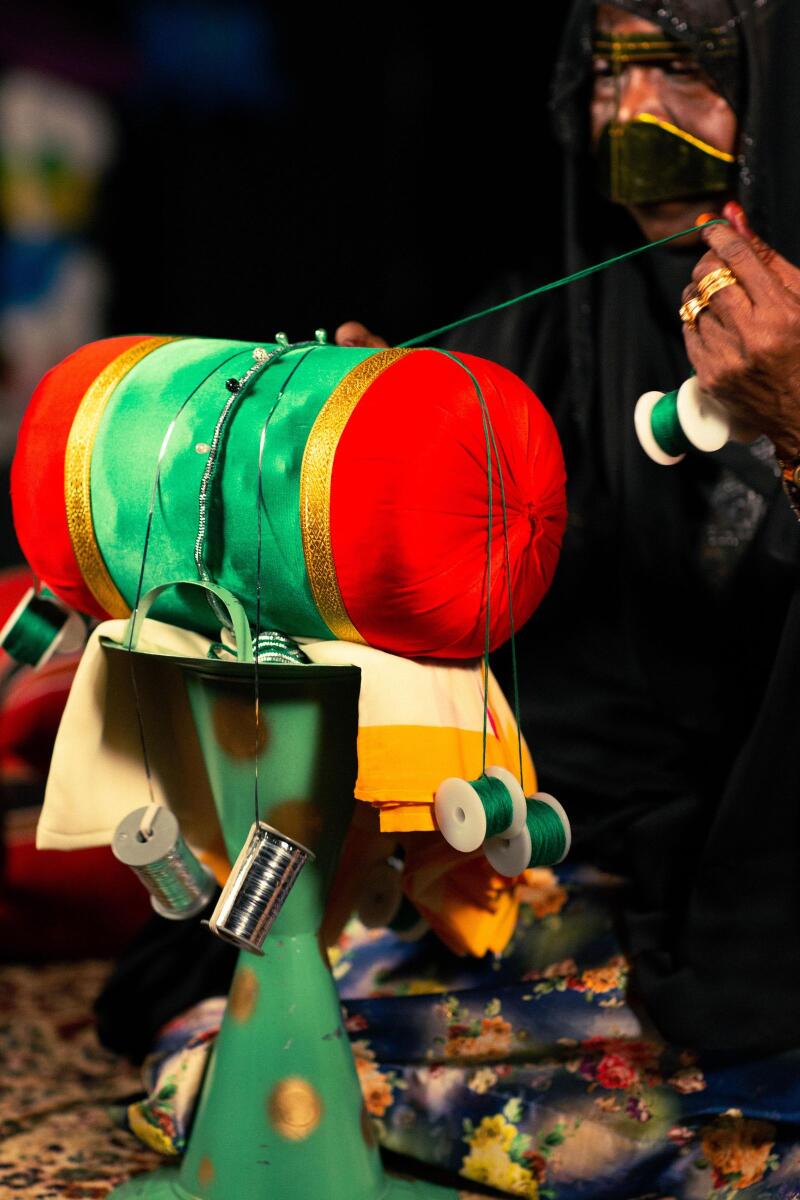A roundup of the best buys to mark the festive occasion
UAE traditional handicraft Talli makes it to Unesco heritage list
Using bright colours and beautiful designs, Talli creates some intricate accents for all types of women’s clothing — from wedding gowns to everyday wear

Adding to the UAE National Day festive cheer, Al Talli — a traditional form of Emirati decorative embroidery — has been included in Unesco’s list of intangible cultural heritage.
Sheikha Latifa bint Mohammed bin Rashid Al Maktoum, chairperson of the Dubai Culture and Arts Authority (Dubai Culture) and member of the Dubai Council, said the recognition for Talli reflects the UAE’s leadership in promoting intangible cultural heritage as well as Dubai Culture’s efforts to preserve the country’s traditional craft.
Talli was inscribed into the representative list of the intangible cultural heritage of humanity during a meeting of the Intergovernmental Committee of the Convention for the Safeguarding of Intangible Cultural Heritage, held in Rabat, Morocco.
Sheikha Latifa noted that Dubai continues to strengthen its efforts to promote the nation’s traditions.
“The UAE and Dubai continue to introduce initiatives to protect the country’s tangible and intangible heritage as part of promoting its unique cultural identity and ensuring future generations are connected to the nation’s cultural roots.”
Talli is a traditional textile handicraft practised primarily by women in the UAE. They use a pillow called ‘mousadah’ as a support to make the braiding.

Different strands of threads are twisted and braided together to create long, narrow strips of textile with fine and elaborate patterns. Using bright colours and beautiful designs, Talli makes an intricate adornment for all types of women’s clothing – from wedding gowns and formal dresses to everyday wear. These skills have been passed down from mother to daughter for generations.
“The success in adding ‘Al Talli’ to the Unesco list reflects the efforts of the UAE’s cultural institutions to preserve the country's distinctive heritage. Dubai Culture has introduced several initiatives to preserve Emirati heritage, promote the country’s values, and create an environment conducive for ensuring the sustainability of heritage industries.”
ALSO READ:
She underlined that in recent years, the UAE has succeeded in including many elements of its heritage and culture in the Unesco list.
“The addition of ‘Al Talli’ to the list will further convey the depth and richness of the UAE’s heritage to the global community. This achievement will also open new horizons for the development of the traditional craft and its use in various spheres of life, in addition to raising the UAE’s profile on the global cultural map.”

Dubai Culture, in cooperation with the Ministry of Culture and Youth, submitted the application titled ‘Al Talli: Traditional Embroidery Skills in the UAE’ to Unesco. The submission highlighted the importance and history of the craft in the country. More than 4,000 women practise the craft across the UAE, Sheikha Latifa said.
ALSO READ:
At the Rabat meeting, a total of 47 elements were inscribed on the intangible cultural heritage lists from submissions made by 60 countries.
“Congratulation to the States that have put forward these proposals, the members of the Committee for the quality of their debates, Morocco for hosting them and the 180 States that bring this Unesco Convention to life. This living heritage plays an essential role in bringing people together and making peace grow in the minds of men,” said Audrey Azoulay, Unesco Director-General.
Date palm, knowledge, skills, traditions and practices in Bahrain, Egypt, Iraq, Jordan, Kuwait, Mauritania, Morocco, Oman, Palestine, Qatar, Saudi Arabia, Sudan, Tunisia, Yemen and Alheda’a, oral traditions of calling camel flocks, were also inscribed.
More news from Lifestyle
UAE resident says banks should do more to educate, help people manage money
Prompted and supported by his wife, Shaista Naz, how former electronic engineer Masroor Syed started and established a business in 1995 that now includes his three sons
She learnt her toughest financial lessons amidst her mother’s battle with cancer
UAE resident shares why she chose the 2020 Nissan Altima to be her road companion
Both as a self-defence method and character-building tool, the role of warrior techniques are unparalleled
Ancient cultures in China, Japan, India and Africa have immense knowledge in traditional healing and many remedies are relevant even today
UAE resident on her favourite ride











